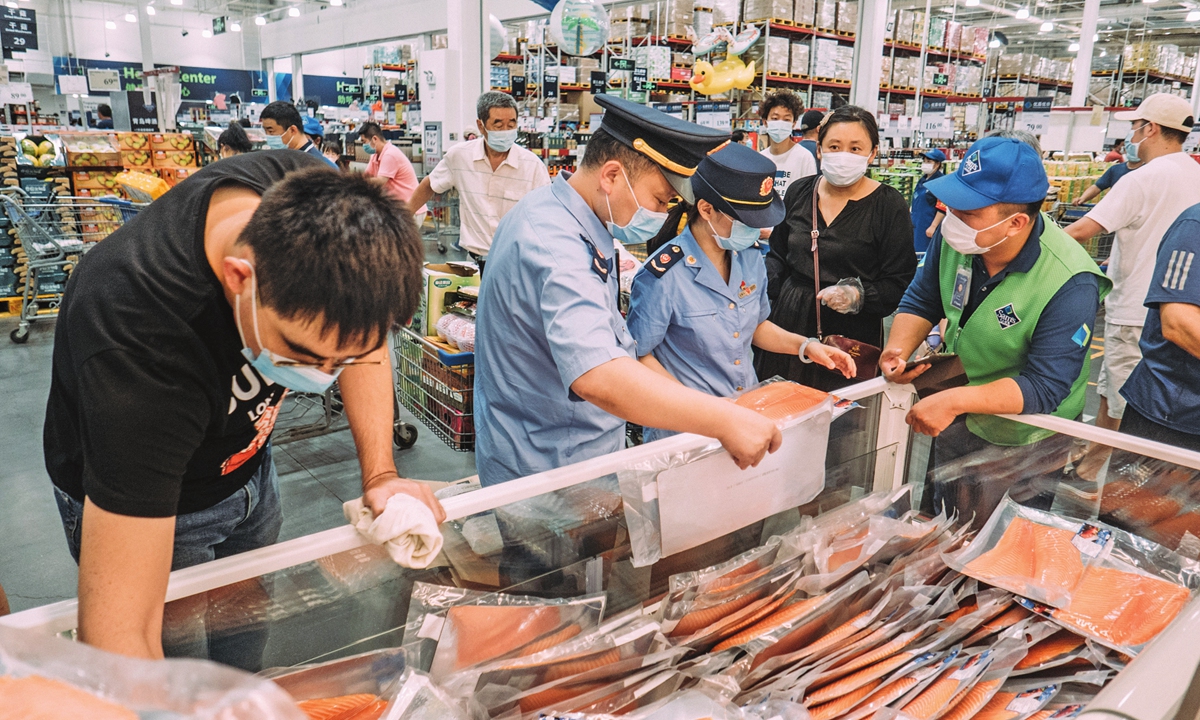Seafood markets come under spotlight amid Beijing’s new outbreak
By GT staff reporters Source:Global Times Published: 2020/6/14 23:30:40
High humidity may contribute to Beijing’s new outbreak: virologist

Food and Drug Administration employees check salmon in a Sam's Club store in Beijing on Saturday. Photo: Li Hao/GT
With infections related to a Beijing food wholesale market hitting 53 on Sunday, seafood markets have entered the public spotlight with many discussing how samples, including one collected from a chopping board processing imported salmon, tested positive for COVID-19.Scientists said that fish and other seafood cannot transmit a virus and that it was more likely that conditions in a large busy market contributed to the local outbreak.
The infection chain has involved 53 people, 51 in Beijing and two in Northeast China's Liaoning Province as of Sunday morning, according to health authorities.
After detection of coronavirus on a chopping board processing imported salmon at the Xinfadi wholesale market, major supermarkets in Beijing, including Carrefour and Wumart, removed salmon from the freezers. Some markets in Southwest China's Sichuan Province and North China's Shanxi Province have also suspended sales of salmon, media reported.
Sushi restaurants are also impacted and many have stopped serving salmon dishes. A Nanjing restaurant association in East China's Jiangsu Province has suggested suspending supplies of raw seafood.
The COVID-19 outbreak in Wuhan, capital of Hubei Province, was reportedly first detected at the city's Huanan seafood market, which led some people to ask whether seafood markets are hotbeds for the virus.
Yang Zhanqiu, deputy director of the pathogen biology department at Wuhan University, told the Global Times on Sunday that these markets sell all types of food. It is more likely that the humid environment and large flows of sellers and customers lead them to becoming virus hotspots, from where it can spread easily.
Yang noted that seafood usually is preserved at a temperature of -20 C. Viruses can remain infectious in such low temperatures for weeks.
The latest infections drove up concerns over consumption of seafood. Beijing local Fan Jingli, after dining at a sushi restaurant, said she was considering having a nucleic acid test to rule out the possibility of contracting the coronavirus.
However, scientists said that there is no possibility that the seafood itself, including salmon, can carry the novel coronavirus.
The novel coronavirus mainly affects mammals and its pathological effects are mainly concentrated in the lungs. Salmon and other seafood cannot host the novel coronavirus. There are no shared diseases that can be spread from fish to humans, media reported.
It is more likely that seafood was contaminated overseas during the long production chain of fishing, packaging and transportation, Yang said. Preliminary gene sequencing found the virus strain in Beijing this time does not resemble the type that widely circulated in the country earlier, said Zeng Guang, chief epidemiologist of Chinese Center for Disease Control and Prevention.
Yang Peng, a researcher from Beijing CDC told China's Central Television (CCTV) via telephone interview on Sunday that it has been preliminarily determined that the virus found on the samples from the market is related to strains China has seen from imported cases. Genome sequencing showed that the coronavirus came from Europe.
Yang said that the source of the virus is still being traced and it is not known how it entered the market.
There are two main theories as to how the virus got into the market. One is through contaminated seafood and meat imported from abroad which infected those who came into contact with it, Yang said.
The other is through people coming into the market and spread through human secretions such as coughs and sneezes which could also have transferred the virus onto seafood or meat.
The COVID-19 tests showed that 40 environmental samples collected from the Xinfadi market, the largest food wholesale market in the capital city, came back positive.
Analysts noted that one person could have become infected after coming into contact with a contaminated product, which may or may not be salmon, and thus became the "patient zero" of this round of infections.
Newspaper headline: Seafood markets come under spotlight
RELATED ARTICLES:
Posted in: SOCIETY,FOCUS